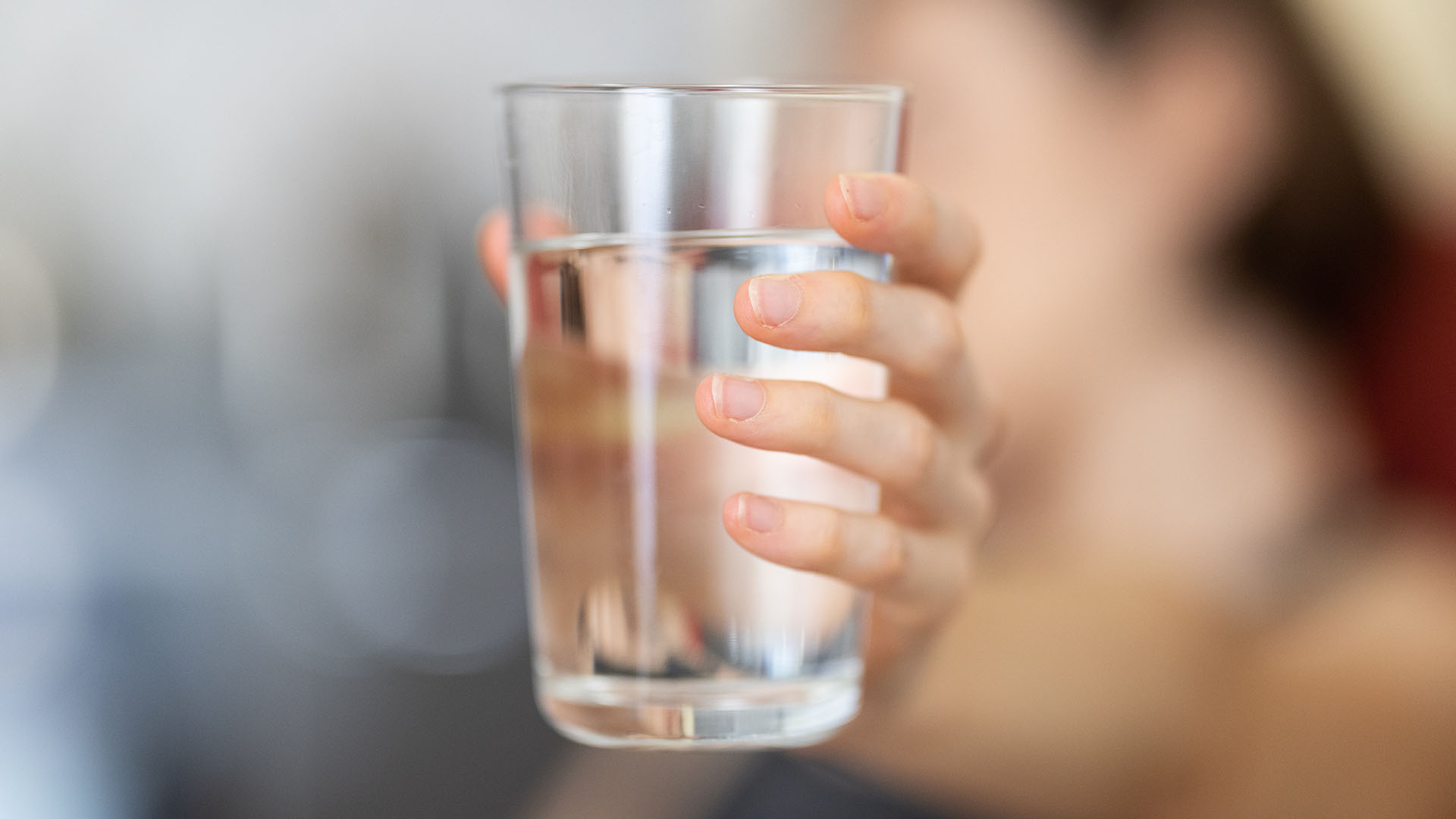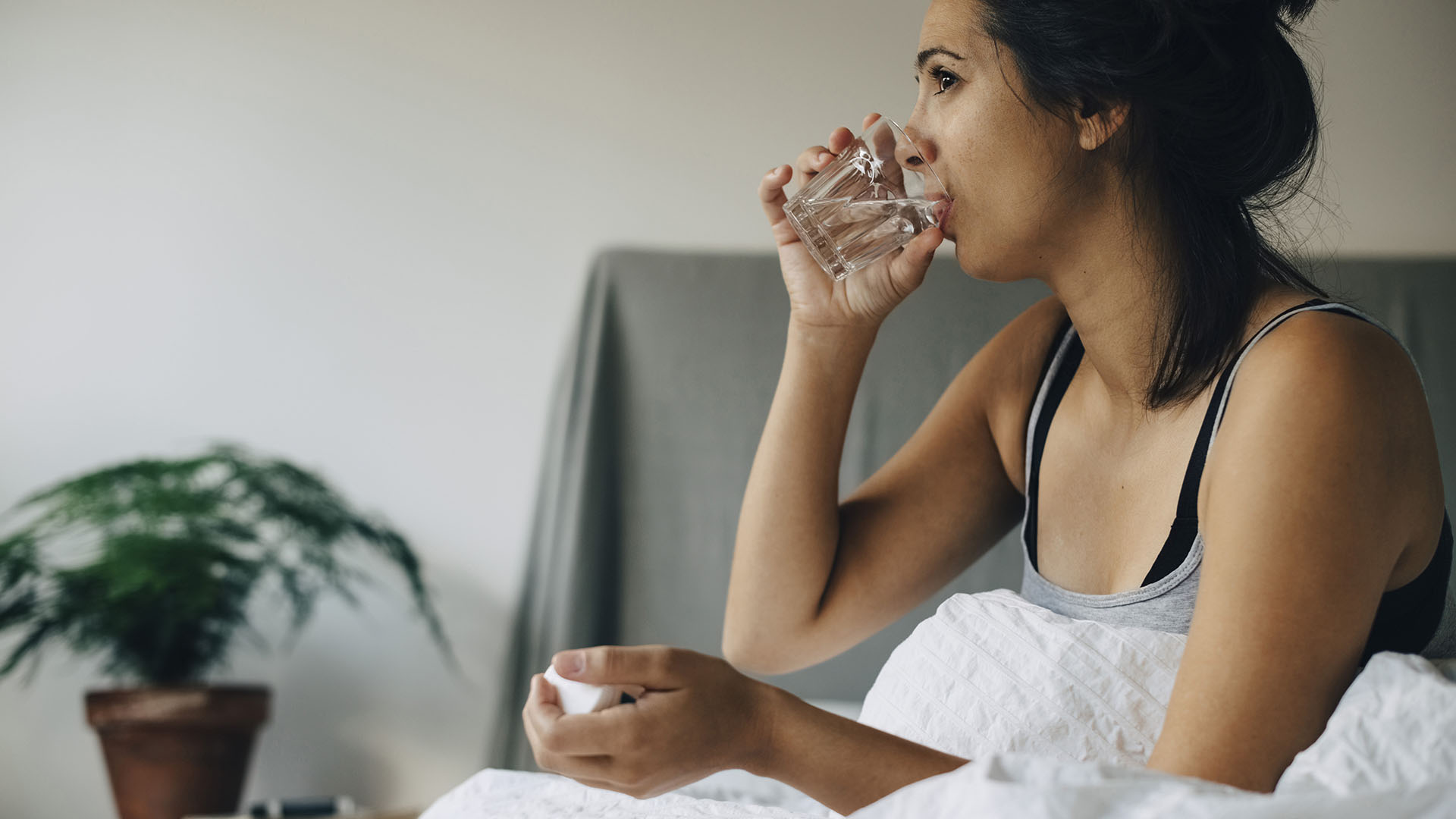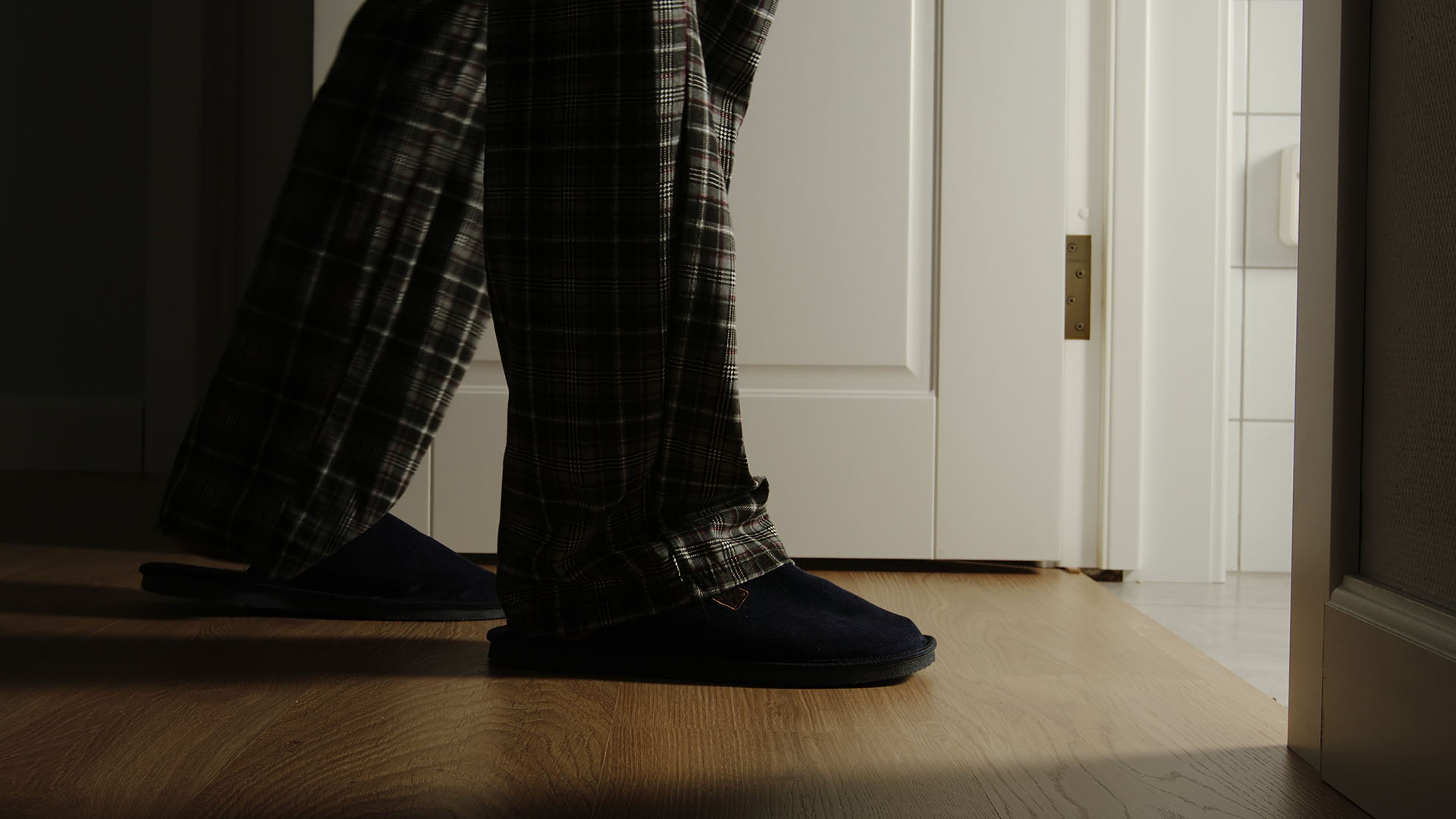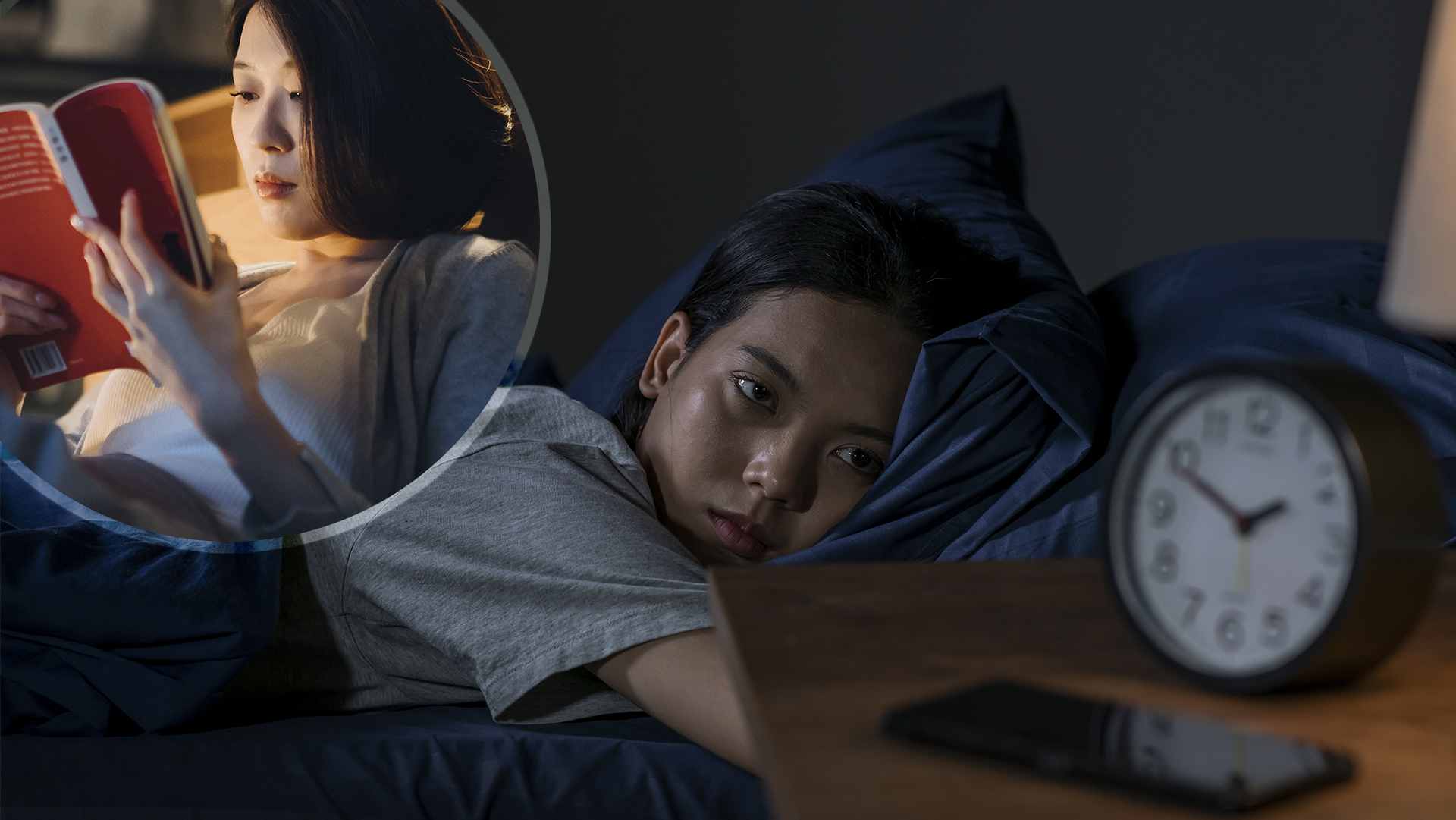When should you stop drinking before bed?
We spoke to a urologist to find out exactly when it's best to stop drinking, to avoid bathroom breaks disturbing your sleep.

There are many things that can cause disturbed sleep, but one is having to get up in the night to wee. In fact, there's a medical term for the interruption of sleep due to the need to urinate: nocturia. It's one of the common reasons why people wake up in the night, and if that's what's stopping you from getting a great night's sleep, adjusting your fluid intake in the evenings might prove an easy fix.
We consulted a board-certified urologist to find out exactly when we should stop drinking fluids in the evenings in order to have the best chance of getting through the whole night without having to get up to use the bathroom. We also discussed the factors that can effect these guidelines, and why it's not a 'one size fits all' rule. (Note that we're not talking about alcohol or caffeinated drinks here. Those come with their own specific side effects, and their own considerations with regards to sleep.)
When should you stop drinking before bed?
If you find yourself waking up frequently throughout the night to urinate – whether that means once or twice on most nights, but especially several times per night – you'll likely find relief by stopping your fluid intake three or more hours before bedtime. That's the recommendation of Michael Ingber, MD, a board-certified urologist based in New Jersey, and it's in line with the numbers stated in the 10-3-2-1-0 sleep rule.
However, Dr. Ingber makes it clear that everyone metabolizes fluids differently, so exact recommendations may vary. "Your rate of absorption depends on a lot of things: your gastric motility (rate of stomach emptying), medicines you may be taking, and how hydrated you currently are. Your kidneys also react differently based on your electrolyte status, and how good your kidney function is." Guidelines will also vary based on age and certain medical conditions – we'll get into that more later in the article.
Of course, you should aim to urinate shortly before getting into bed to minimize the chances of waking up to do so throughout the night. And if nighttime trips to the bathroom don't stand in the way of your sleep, Dr. Ingber says that the three-hour rule need not apply.

Is it normal to have to wake up in the night to wee?
While inconvenient, the occasional need to urinate in the middle of the night also shouldn't be a major cause for concern. On the other hand, three or four late-night trips to the bathroom "is a bit more than what is considered normal," explains Dr. Ingber. Note that this does vary by age. While nocturia is pretty common in people over the age of 50, it's less usual for younger people to struggle from poor sleep due to waking up throughout the night to use the restroom.
It is worth doing what you can to remedy the situation: research shows that nocturia can be associated with long-term sleep deprivation, which itself is linked to its own risks for immunity, sense of well-being, and overall health status. If your sleep quality suffers due to an overactive bladder, and that three-hour rule isn't working for you, it's worth ceasing your liquid intake earlier in the evening and/or consulting your physician for further investigation.

Michael Ingber, MD, is board-certified in Urology and Female Pelvic Medicine & Reconstructive Surgery. He is the director of The Center for Specialized Women’s Health in Denville, NJ and is the Chief Medical Officer of LiviWell, a sexual health research and development company.
How can I make sure I'm still hydrated?
Adequate hydration is important for everyone, but it's better to focus on getting enough H2O intermittently throughout the day, instead of trying to 'catch up' to quench your thirst at night – especially if you want to improve your chances of staying asleep.
"The kidneys basically 'regulate' the fluid in your body. If you're dehydrated, they absorb the excess fluid and you'll pee less. On the other hand, if you drink a lot, especially near bedtime, the kidneys will excrete the fluid in the form of urine, down the ureters (drainage tubes) to the bladder, which will store urine," Dr. Ingber explains.
He adds that most men can store up to 500 milliliters of fluids in the bladder, and women can store up to 400 milliliters. If you exceed these amounts too close to bedtime, you may find yourself waking up in the middle of the night to relieve yourself, which can impede a good night's rest.
Get instant access to breaking news, the hottest reviews, great deals and helpful tips.

Who might want to consider stopping drinking earlier?
People with specific health conditions may stand to benefit from ceasing liquid intake earlier than three hours before bedtime. "Certain patients with GERD, or reflux, may benefit from stopping fluid intake as early as after dinner," Dr. Ingber continues. (The physician adds that he follows this time limit himself to control his own reflux, as well as complement his intermittent fasting regimen.)
If you have issues with your heart, circulation, and/or veins, Dr. Ingber says that overhydration can cause additional risks. "Excess fluid intake can lead to edema (swelling in the lower legs), which can be uncomfortable. When some of these patients lay down at night, the fluid in the legs gets reabsorbed by the body and the kidneys excrete this as urine," he shares. "That's why we often recommend elevating your legs in the afternoon if you notice swelling like this, or taking a diuretic (water pill)."
Finally, Dr. Ingber says that people with urge urinary incontinence, which occurs in people with an overactive bladder, should be especially mindful of their fluid intake close to bedtime. "They feel they have to wake to urinate, and if they don't get to the bathroom on time, they will have an accident," he shares.
Older folks with this condition must take even greater caution. "In the elderly, men and women with urge urinary incontinence at night have an increased risk of falls and fractures compared to the rest of the population," he warns.
Michele Ross is a freelance writer based in Los Angeles. For Tom's Guide and TechRadar, she interviews medical experts for sleep tips and tricks, as well as reviews mattresses and toppers to see which ones are truly worth buying for different types of sleepers and budgets. She has also covered a range of sleep topics for publications and brands including Well+Good, HUM Nutrition, and Mini Bloom, among others.

